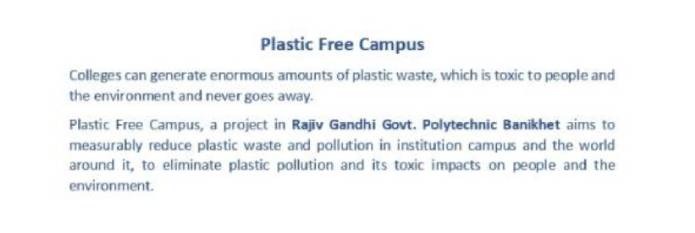Principal's Desk
Education is important for every individual in a nation. It plays a vital role in shaping and orienting its youth for better deliverance. No country could bring revolution in it unless its nationals are educated enough to meet the challenges. The Technical Education is a branch of Vocational education which deals practically in the field of Trade, Commerce, Industry, Agriculture, Medicine and Engineering.
The history of imparting formal Technical Education in India can be traced back to mid 19th. Century, got momentum in 20th century and gained due importance in the 21st. century. The global technological advances are attributable to the spread of Technical education uniformly throughout the world. We are lucky to be living in a world where the technology is touching the ever-new heights.
From the first Five year Plan onwards India’s emphasis was to develop a pool of scientifically inclined manpower. India’s National Policy on Education (NPE) provisioned for an apex body for regulation and development of Higher Technical Education which come into being as the A-I-C-T-E in 1987 through an Act of Parliament.
Technical Education Courses in India: The courses, which are known as ‘technical’ in India and therefore come under the purview of All India Council of Technical Education are- degree and diploma courses in Engineering, Master degree Courses in Engineering, Master of Computer Application (MCA), Master of Business Administration (MBA), Pharmacy Courses, Courses in Architecture, Applied Arts and craft, Hotel Management and Catering Technology Courses and other related areas in engineering & technology.
The country has demonstrated a capability of producing eminent and competent technocrats who have been responsible for many innovations not only in India but all over the world. Being the largest producer of scientific and professional manpower, India has already established its comparative advantage in the knowledge led business.
Approximately 7.2% of the adults in the 17-24 years age group have the privilege of getting higher education. As compared to this, the figure for US and Australia in 80%, Canada 88%, Finland 74% and UK 52%. This figure for India has to be augmented to at least 25% before 2020.
Our efforts should supplement the government policy to promote & widen the arena of Technical Education in the country. The concerted & sincere approach will no doubt lead us through the path which is full of hurdles like low level of awareness, low per capita expenditure on education and precedence of other important problems over this.
Thus there is an urgent need to enlarge the role and relevance of our universities and Technical institutions to reach a large community.
(Sh. Pardeep Kumar)













